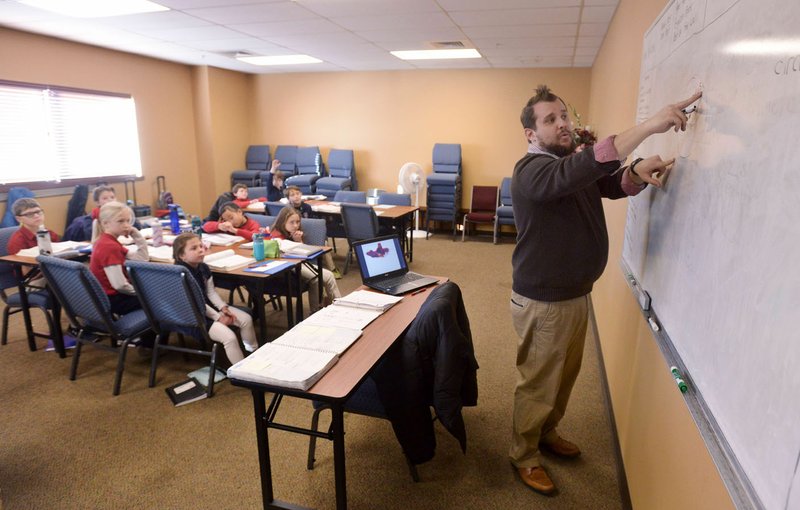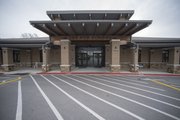Editor’s note: This region is experiencing a large increase in the types of schools and learning approaches available. The Northwest Arkansas Democrat-Gazette explores those options and their impact on the education landscape in a seven-part series beginning today.
The options available for educating children in Northwest Arkansas have never been more abundant than now.
The traditional public school districts dominated the kindergar - ten-through-12th-grade landscape 20 years ago. A few small private schools provided the main alternatives.
Then a 1995 charter school law introduced a new kind of public school to the state. Northwest Arkansas has 13 charter schools; some are run by school districts, some by other types of organizations. There were 6,340 students attending those 13 schools as of Oct. 1, about 7.5 percent of all public school enrollment in the area.
“We want it to be a world-class system of schools that is comparable to all the best school districts or regions you hear about throughout the country and throughout the world.”
— Kim Davis, Walton Family Foundation senior program officer for education
The private-school sector has grown as well. Two of the private schools in Northwest Arkansas — Life Way Christian School in Centerton and Providence Academy in Rogers — opened after 1999. Those two schools now serve more than 1,000 students combined. The region stands to gain at least two more in the next few years: The Thaden School, a private school set to open in Bentonville next fall, and Ozark Catholic Academy, the area’s first Catholic high school, which officials plan to open in August 2018.
And a small but increasing number of parents are choosing to educate their children themselves. The number of home-schooled children in Benton and Washington counties has grown more than 150 percent in the past 20 years, according to data kept by the Arkansas Department of Education. There were 3,675 home-schooled students in the two-county area last year.
Yet another educational option — a relatively new one — is the online, or virtual, school. Hundreds of Northwest Arkansas students connect with their teachers almost exclusively through the Internet.
FINDING THE MOTIVATION
There are several indicators Northwest Arkansas’ traditional public schools are performing well in relation to other districts across the country.
Thirteen of the 15 school districts in Benton and Washington counties, for example, posted graduation rates in 2015 that exceeded the national average, according to the most recent annual report on education in the region produced by the Office for Education Policy at the University of Arkansas.
“Northwest Arkansas continues to lead the state in K-12 education,” the report states.
So, why such demand for alternatives to the traditional public schools? Even if they’re solid schools, one size doesn’t fit all, said Gary Ritter, faculty director at the Office for Education Policy. For example, not every student is comfortable at a school as large as Bentonville High School, which has 3,400 students.
About 84,000 students fill the public schools of Benton and Washington counties. That’s an increase of about 40 percent since 2004. With a growing population comes more diverse interests and needs, Ritter said.
“And when you have more kids, you have more opportunities to try new kinds of things,” he said. “In a small town, there are barely enough kids to fill one set of seats. But our region is so big, we have not only the interest in other options, whether in academics or configuration of the school or size of the school, but we also have the capacity to fill seats.”
The increasing number of choices is not an indictment of the existing school options, he said.
“The schools could be great. They could be perfect. But it could be, my kid prefers an arts school, or my kid prefers a small school,” Ritter said.
The traditional school districts are responding to that increasing demand for choice. The Rogers School District branched out from the typical high school model in 2013 when it opened New Technology High School, a smaller school that emphasizes a project-based learning approach to education.
Rogers is preparing to launch its Honors Academy, a program designed to motivate more of the district’s brightest students to take challenging courses and help them explore all of their college options.
Smaller districts also are changing to adapt to student needs. Gentry High School introduced a diesel mechanics and career program to better serve students not headed to college.
“A lot of the things we’re doing now are giving children better chances, better opportunities,” said Randy Barrett, Gentry’s superintendent. “I’ve tried to say to people, ‘You kind of have to ride the crest of the wave of change; otherwise, you may get swept away by it.’”
THE WALTON INFLUENCE
The Thaden School is an initiative of the Walton Family Foundation, which has played a significant role in the development of Northwest Arkansas’ schools.
The foundation is well known for its support of charter schools — public schools that sign agreements, or charters, that bind the schools to meeting certain enrollment, financial and academic goals. Charter schools can be experimental and are exempt from some laws governing conventional public schools.
The foundation provided dozens of grants last year worth nearly $180 million to K-12 education nationwide; more than $20 million of that went toward 100 new charter schools, according to the foundation’s website.
But the foundation also has partnered with traditional public schools on projects, said Kim Davis, its senior program officer for education.
The foundation, for example, provided the Bentonville School District a $240,000 grant last year to support development of the district’s Ignite Professional Studies Center, a program focused on training high school students for specific careers in partnership with local businesses.
“We know there are really good school districts and really good schools in Northwest Arkansas,” Davis said. “But good is not the goal for us. We want it to be a worldclass system of schools that is comparable to all the best school districts or regions you hear about throughout the country and throughout the world. So we take a real holistic approach in that view.”
The foundation aims to invest more than $53 million in development of a world-class system of schools in Northwest Arkansas between 2017 and 2020, according to Luis Gonzalez, senior communications officer.
A diversification of educational options in an area tends to produce better educational outcomes, and that’s tied to the area’s quality of life, Davis said.
“The quality of life becomes very important to attracting and retaining high-caliber talent” for businesses, he said.
Northwest Arkansas’ strong business community has drawn many professionals to the area who are highly qualified in their respective fields. Through programs like Ignite, schools are taking advantage of this environment by drawing professionals into academic environments, Davis said.
“We have the opportunity with the expertise and knowledge of everyday residents to create an educational environment that we think could rival other places in the world,” he said.
Cameron Smith, president and founder of the executive search firm Cameron Smith & Associates in Rogers, said the quality of the schools is the main concern of people his firm recruits, many of whom come from the East Coast.
“It’s usually the first subject that comes up,” Smith said.
It’s easier to sell people on Northwest Arkansas than it’s ever been, and that’s in part because of the kinds of schools developing here, he said.
“We’ve very excited about these new schools being built. The more options these people have, the easier it is for us to recruit in,” Smith said.
THE CHARTER MOVEMENT
The introduction of a law permitting charter schools in 1999 was a landmark event in Arkansas’ school choice movement.
The state’s first charter school law passed in 1995 but yielded no charter applications because of certain restrictions, namely that only public school districts and higher education institutions could start a charter school. It also allowed local districts and teacher groups to veto charter school applications.
John Brown III, a Republican from Siloam Springs and former president of John Brown University, helped lead the charge for a revised charter law while serving in the state senate.
“(President) Bill Clinton was stating support for charter schools,” Brown said. “So there was a movement. There was a feeling we should explore them for the purposes of accountability and quality of education in Arkansas.”
Senate Bill 562, co-sponsored by Brown and Jim Argue, a Democrat from Little Rock, repealed the old charter law and set up new procedures for getting a charter application approved. It also paved the way for public, open-enrollment charter schools, which could be set up by nonprofit organizations and attended by any student in the state for free.
It took about three years of negotiation to craft the bill, but in the end it earned near-unanimous support from legislators and other interested parties.
“We spent a lot of time reminding people there’s no such thing as a private charter school,” Brown said.
It’s fitting, perhaps, that Siloam Springs High School — from which Brown graduated in 1967 — was converted into a charter school by the district last year. The school’s charter status facilitates a greater emphasis on vocational classes and allows students the option to take more Advanced Placement and concurrent college courses.
“I think there have been a lot of good things that have come from the law in Arkansas. It’s changed; it’s evolved; it’s been improved,” Brown said.
Web Watch
See this and the upcoming stories as they publish at nwadg.com
MULTIPLE CHOICES
Coming tomorrow:
Charter schools
Dave Perozek can be reached at [email protected] or on Twitter @NWADaveP.
Education highlights
1948
• St. Joseph Catholic School opens in Fayetteville with 39 students. It now serves almost 300 in preschool through eighth grade.
1957
• St. Vincent de Paul Catholic School opens in Rogers with 50 students in grades one through eight. It now serves more than 300.
1971
• The New School, a private school, opens in Fayetteville with 24 students ages 3 to 6. It now serves about 420 students in preschool through ninth grades.
1976
• Shiloh Christian School is founded as a ministry of the First Baptist Church of Springdale, now called Cross Church. The school opens with 180 students in grades kindergarten through six. It now serves more than 1,000 from preschool through 12th grade.
1978
• Fayetteville Christian School opens. Typical yearly enrollment is now around 250 in preschool through 12th grade.
1992
• The nation’s first charter school opens in St. Paul, Minn.
1995
• The Arkansas Legislature passes a law allowing charter schools, but no charter schools open under this law.
1996
• Ambassadors for Christ Academy opens in Bentonville with 120 students. Current enrollment is about 95 students in grades kindergarten through 12.
1999
• Gov. Mike Huckabee signs a new, less restrictive charter school law allowing both school districts and nonprofit groups to start charter schools.
2000
• Life Way Christian School, a ministry of First Baptist Church Centerton, opens with 54 students. It now has more than 500 in preschool through 12th grade.
• Arkansas’ first four charter schools open. Each, including one in Rogers, is operated by either a public school district or an educational cooperative made up of several districts.
2001
• Benton County School of the Arts, the first open enrollment charter school in Northwest Arkansas, opens in Rogers with 300 students in kindergarten through seventh grade.
2002
• The number of home-schooled students in Northwest Arkansas surpasses 2,000.
2004
• Public school enrollment in Northwest Arkansas surpasses 60,000.
• Haas Hall Academy, the region’s second open enrollment charter school and the state’s first high school-level charter, opens in Farmington. It ends the school year with 13 students. Haas Hall now operates campuses in Bentonville and Fayetteville with a combined enrollment of 645.
• Providence Academy, a private school, opens in Rogers with 39 students in grades kindergarten through six. It now has 460 in kindergarten through grade 12.
• Benton County School of the Arts moves into a facility at 2005 S. 12th St., where its elementary and middle grades remain today. The facility formerly housed Benton County Christian School.
2005
• Legislators amend the charter school law to double the maximum number of open enrollment charter schools from 12 to 24. There are nine open enrollment charter schools in the state.
2007
• The Northwest Arkansas Academy of Fine Arts, a charter school for grades nine through 12, opens in Rogers with about 170 students.
2008
• Public school enrollment in Northwest Arkansas surpasses 70,000.
2009
• Haas Hall Academy, now with 120 students in grades nine through 12, moves to Fayetteville.
• Benton County School of the Arts and Northwest Arkansas Academy of Fine Arts merge to form one charter school for grades kindergarten through 12. The combined enrollment is about 700.
2011
• Legislators allow the state’s limit on open enrollment charter schools to increase by five every time the number of schools reaches within two of the new limit. There are 17 open enrollment charter schools in the state; the maximum is 24.
2012
• The number of home-schooled students in Northwest Arkansas surpasses 3,000.
• Haas Hall Academy receives a 10-year renewal of its charter, the longest renewal granted by the state.
2013
• Northwest Arkansas Classical Academy opens in Bentonville as the region’s third open enrollment charter school. Initial enrollment is about 400 students in kindergarten through eighth grade. It now has 556 students in grades kindergarten through 11.
• The Rogers School District opens its own charter school, New Technology High School, starting with about 290 students.
• Legislators allow school districts to establish schools of innovation that may receive some of the same types of exemptions from state standards that charter schools get.
• Legislators require traditional public schools to offer home-schooled students the chance to participate in any of their interscholastic activities, such as an athletic team, band, choir or debate.
2014
• Public school enrollment in Northwest Arkansas surpasses 80,000.
• Benton County School of the Arts changes its name to Arkansas Arts Academy. Fall enrollment for kindergarten through grade 12 is 758.
• The Pea Ridge School District opens a charter school, the Pea Ridge Manufacturing and Business Academy, starting with 87 students.
• The Springdale School District opens its School of Innovation at The Jones Center to 200 eighth-graders. The school received a waiver allowing students to earn credit for a class based on their competency in a subject and not how long they are in class.
2015
• Legislators establish the state’s first voucher system with the Succeed Scholarship, which allows students with special needs to apply thousands of dollars in state money per year toward tuition and fees at approved private schools.
• The Walton Family Foundation announces plans to open a private school in Bentonville in fall of 2017. The Thaden School is expected to start with grades seven and nine and expand to grades six through 12.
• Haas Hall Academy moves into new space in Fayetteville and opens a second campus in Bentonville, serving more than 600 students combined.
• Farmington and Siloam Springs high schools make their debuts as charter schools. The Career Academy of Siloam Springs, a charter school within the high school, also opens.
• Ozark Montessori Academy, an open enrollment charter school, opens in Springdale with 136 students in kindergarten through grade six.
2016
• Providence Academy officials announce plans to build a new campus on 66 acres off Spring Creek Road in Lowell.
• Haas Hall Academy receives approval to open additional campuses in Springdale and Rogers.
• John Rocha, development director of an all-boys Catholic school in Houston, is hired to be the first head of Ozark Catholic Academy, which officials plan to open in 2018 as the first Catholic high school in Northwest Arkansas.
• The New School in Fayetteville, which serves more than 400 students in preschool through ninth grade, announces plans to add a high school to its campus. Construction of three buildings begins, all of which are scheduled to open for the 2017-18 school year.
• The Fayetteville School District launches an online charter school for grades four through eight.
• Gentry High School becomes a conversion charter school, allowing the school to shift its focus from preparing students for college to preparing students for careers.
• Arkansas Connections Academy, based in Bentonville, becomes the state’s second online charter school. It serves more than 300 students statewide.




